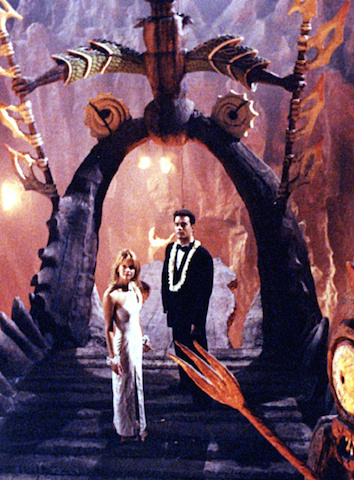Friday, March 9, 1990.
JOE VERSUS THE VOLCANO. Music by Georges Delerue. Written and directed by John Patrick Shanley. Running time: 102 minutes. Rated mature with the B.C. Classifier’s warning: occasional coarse language.
IT'S SIMPLE. JOE BANKS (Tom Hanks) is dying.
According to Dr. Ellison (Robert Stack), Joe has a "brain cloud . . . a black fog of tissue running right down the centre of (his) brain."
It's not painful. He'll be perfectly healthy for about six months and then his brain "will fail, followed shortly after by (his) body."
Industrialist Samuel Harvey Graynamore (Lloyd Bridges) knows this. "I want to hire you, Joe Banks. I want to hire you to jump into a volcano," he tells the terminal man.
It's a matter of mineral rights. The natives of Waponi Woo, an island in the South Pacific, need a human sacrifice to appease their fire god. They're willing to make a deal.
Graynamore, America's superconductor king, puts all his cards on the table — American Express, Diner's Club, MasterCard, VISA Gold. "Live like a king," he says to Joe. "Die like a man!
"Whaddaya say?"
* * *
While Joe is thinking it over, a word about writer-director John Patrick Shanley is in order.The man is a lunatic.
A dramatist with an eye for the sky, Shanley made his formal writing debut in 1982 with a cycle of one-act plays called Welcome to the Moon.
Two years ago [1987], he won an Oscar for his second produced screenplay, director Norman Jewison’s Moonstruck.
When he offered his script for Joe Versus the Volcano to Steven Spielberg, the E. T. director said yes. Over the years Spielberg has made it his business to sponsor cinematic visionaries.
Shanley, like Joe (Gremlins) Dante and Robert (Back to the Future) Zemeckis, was invited to direct his own film for Spielberg's Amblin Entertainment.
* * *
"I'll do it," Joe Banks tells the billionaire. What's he got to lose?He's already quit his job as advertising librarian for the medical supply company American Panascope ("Home of the Rectal Probe").
What's to be gained?
A great deal. Shanley, a whimsical moralist, makes it clear that Joe's quest is really a search for his own soul.
A traditional fairy tale — it even begins with "once upon a time . . . " — Joe Versus the Volcano offers modern myth in the guise of romantic comedy. Deliberately dreamlike, it features Meg Ryan as all the women in Joe's life.
As DeDe, Joe's mousy, asthmatic co-worker, she is Gilda Radner-like, playing a character as grey and fearful of life as Joe himself.
As Angelica, Graynamore's flamboyant, "flibbertigibbet" daughter, she turns herself into Madeline Kahn to reflect Joe's confused state of mind. A wannabe poet, she reacts to Joe’s dire situation with her signature line: “I have no response to that.”
Finally, as Patricia, Angelica's self-reliant half-sister, Ryan becomes herself. Though she complains of being "soul-sick," Patricia is an adventuress destined to become Joe's own soulmate.
Turned loose in the Hollywood toy shop, Shanley has produced a first feature rich in classic film resonance — there are strong echoes of Metropolis and The Wizard of Oz — shaped to his own heroic fantasy vision.
And, yes, there is a moon scene.
Not so simple after all, Joe Versus the Volcano is a movie filmgoers should say yes to.
The above is a restored version of a Province review by Michael Walsh originally published in 1990. For additional information on this archived material, please visit my FAQ.
Afterword: In 2005, The A.V. Club website posted an article listing “10 Notorious Flops Worth Seeing”. Included among them was that 1990 oddity Joe versus the Volcano. At the time that I wrote the above positive review, I had no idea how out of step I was with the critical consensus in New York.
John Patrick Shanley had been on my personal radar since 1987, the year in which he made his screenwriting debut with a remarkable drama called Five Corners. The third theatrical feature from actor-turned-director Tony Bill, it also counted as a flop, though nowhere near as “notorious” as Joe versus the Volcano (which lost money for a big Hollywood studio rather than independent investors). I could relate to his skewed tale of urban life in the mid-1960s and, again in the minority, had nothing but praise for Shanley’s vision.
There’s something about aging that makes one appreciate the adventure of life. Curmudgeon that I am, I now count the marvellously nutty Joe versus the Volcano among my favourite films. Though currently best remembered for writing and directing the 2008 Catholic school drama Doubt (nominated for five Academy Awards), I found his recent film's honest ambiguities less compelling than Shanley’s earlier celebration of affirmative insanity. I’m especially fond of Patricia’s recollection of her father’s prescient observation that “almost the whole world is asleep. Everybody you know. Everybody you see. Everybody you talk to. He says that only a few people are awake and they live in a state of constant total amazement.”
And, indeed, isn’t that amazement what makes life worth living?
